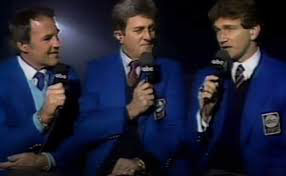|
Super Bowl XIX - San Francisco 49ers vs Miami Dolphins: Pregame
The 1984 San Francisco 49ers used their bitter, disappointing season-ending 24-21 loss to Washington in the NFC Championship Game as motivation for the 1984 season.
- The loss was bitter because the Niners felt several phantom pass-interference calls in the final minutes allowed the Redskins to kick the winning field goal in the final minute.
49ers owner Eddie DeBartolo was convinced the controversial calls were linked to his own battle with the NFL. "If the league is out to get me," he declared, "they did a good job." The other NFL owners were upset that the DeBartolo family wanted to purchase a franchise in the rival United States Football League.
- RB Roger Craig recalled, "Coach Bill Walsh was pissed after that game. Heck, we all were pissed. We all made a pact to come back and win the Super Bowl the next year."
- Rather than whining about it or pointing fingers, the 49ers dedicated themselves to making sure it didn't happen again. QB Joe Montana picked up the determination the first day of training camp in July. "There was a certain kind of intensity that I spotted immediately, a no-nonsense attitude. Defensive backs were playing in practice as if it were a game. ... In '84, we were going to do everything in our power not to be denied."
- The only flies in the ointment were the holdouts of DE Fred Dean, who led the league with 17.5 sacks in '83, and All-Pro S Ronnie Lott. Lott had a year left on his rookie contract but was woefully underpaid by the current standards. Walsh and DeBartolo admitted as much. But he was demanding $800,000 a year to equal the highest-paid defensive player in the league - Jets DE Mark Gastineau. But that would have made him the highest-paid player on the 49ers, surpassing even Joe Montana, and Walsh insisted that would not happen. Lott signed a new deal for $2.3 million over four years and reported to training camp a week late. Dean stayed out for most of the season before returning for the last five games.
- Coach Bill Walsh devoted his annual off-season tinkering with the roster to developing depth rather than filling holes in the starting lineup. So in the draft, he was able to focus on selecting the best players regardless of position. Five of that year's class would eventually become starters: LB Todd Shell, TE John Frank, G Guy McIntyre, NT Michael Carter, and S Jeff Fuller. In the meantime, they provided the needed depth.
- The '84 Niners came within three points of an undefeated season. The only loss came in Week 7 at home to the Steelers 20-17 as San Francisco became the first team to win 15 games in the regular season since the NFL went to a 16-game schedule in 1978.
The 49ers felt they had been cheated out of an undefeated season. Walsh recalled: "Our only loss was a close, hard-fought game to Pittsburgh decided by a phantom goal-line pass-interference call on Eric Wright. ... (Steelers coach) Chuck Noll was very gracious about that later. He, too, questioned the call but told me, 'You're going to go all the way.' The loss may have sharpened us for the remaining games because it reminded us that anything could happen."
- Included in the victories was a 37-31 triumph over the Redskins in the second week's Monday Night game. The 31 points would prove to be the most scored against the Niners all season by ten.
- Frisco led the NFC in points scored (475) and the entire league in fewest points allowed (227).
- They also led the conference in fewest sacks allowed.
After enjoying a bye week, the 49ers continued their dominance in the playoffs.
- The defense, which rotated nine linemen, led the way in both games.
- First came a 21-10 victory over the Giants.
- The defense was even more effective in the NFC Championship Game, a 23-0 shutout of the Bears, who upset the Niners' nemesis, the Redskins, in the previous round.
Walsh later wrote of his 1984 team: "We had our defensive backfield, one of the best that's ever taken the field, with Eric Wright and Ronnie Lott at the corners, and Dwight Hicks and Carlton Williamson at safeties. They were all Pro-Bowl performers, and Lott will be a Hall of Fame player."
The only NFL team that scored more points than the 49ers were the AFC champs, the Miami Dolphins.
- Just as Joe Montana changed the fortunes of the 49ers when he became the starter in 1980, Dan Marino led the Dolphins to the Super Bowl in just his second year in the league.
- Coach Don Shula knew that David Woodley, his quarterback in Super Bowl XVII, was adequate at best and had Marino pegged as the top quarterback in the 1983 draft but didn't think he had a chance at him with the second-to-last pick in the first round. However, concerns about Marino's relatively poor senior year and rumors that he was hard to handle caused five other quarterbacks to be picked ahead of him.
Shula's risk in taking Marino was similar to Walsh's selection of Joe Montana several years earlier. Joe was ignored by all 28 clubs through the first two rounds of the draft. Finally, Walsh took him in the third round as a gamble that hit the jackpot.
- Marino didn't become Miami's starter until the sixth week of his rookie season, but he immediately took charge of the offense, guiding the team to a 12-4 record and the AFC East title. He threw 20 TD passes and recorded a 96.0 passer rating to earn Rookie of the Year honors. Dan became the first rookie quarterback to start in a Pro Bowl game.
- Marino's performance the following season was unlike any seen in NFL history as he guided "Don Shula's Flying Circus" to a 14-2 record and a division crown. He became the first player ever to pass for 5,000y in a single season. His 48 touchdown passes obliterated the previous record of 36 held by Y.A. Tittle and George Blanda. He set six NFL records and was named the league's MVP.
The change in Shula's approach to football is illustrated by these statistics:
His 1972 Dolphins went 17-0 throwing the ball just 28% of the time (18.5 passes per game).
The '84 Dolphins threw 54.1% of all snaps (35.3 passes per game).
- Shula summarized his sensational quarterback as "a player with a quick release and a gun for an arm, stronger than (Bob) Griese's. He has decent mobility and a way to get the ball where he wants it. He sees well downfield. No matter what anyone throws at him, he doesn't get rattled. He's just a natural leader."
As a result, "our philosophy is completely different than two years ago" (when they lost to the Redskins in Super Bowl XVII). "We're throwing the ball - that's the basis of our offense, utilizing the strength of Marino. But I still believe we have to have a running game."
Griese, Shula's quarterback on the back-to-back Super Bowl champions of 1972-73, explained how Don handled his signal-callers. "He gives a quarterback confidence. If a quarterback has a suggestion that makes sense, he listens. Shula's the captain of the ship, but he's not above listening to somebody else. If the quarterback doesn't like a play, Shula won't make you run it."
Marino could not have accumulated such gaudy statistics without outstanding receivers and effective running backs.
- The "Marks Brothers," Clayton and Duper, both made the Pro Bowl, catching 73 and 71 passes respectively for 1,389 and 1,306y. Clayton's 18 touchdown catches set an NFL record.
- A trio of running backs kept defenses honest. FB Woody Bennett gained 606y while Tony Nathan added 558 and Joe Carter contributed 495. Nathan also had 61 receptions - the second most by an AFC running back. Shula called him "one of the best all-around backs that you'll see in the National Football League. He can do everything."
- To add to the woes of opposing defenses, the Dolphins were considered to have the best offensive line in the whole league. Two Pro Bowlers anchored the front five: C Dwight Stephenson, in his fourth year in the league, and 11-year veteran Ed Newman at right guard. They allowed the fewest sacks in the NFL - 14, or an average of less than one per game. Shula praised his center. "You've got to be strong down the middle, and Dwight's as strong as they come. We think we've got the best there is."
- And like most of Shula's teams, the Dolphins did not beat themselves. They led the league in fewest penalties for the ninth straight year.
Like the 49ers, Miami enjoyed a bye week as the #1 seed.
Shula, the old defensive back, prided himself on his defenses, and his 1984 aggregation measured up statistically to his demanding standards.
- The unit was called the "Killer B's" because eight of the eleven starters bore last names starting with the letter B.
- They finished fifth in the AFC and seventh in the league in points allowed - 298, just one more than the Browns. That put them not too far behind the '83 unit, which led the conference in points allowed with 250. The defense of the '82 Super Bowl team also ranked at the top of the AFC in that strike-shortened season.
- The Dolphins showed many variations in their base 3-4 defense. LB A. J. Duhe, a star of the '83 defense, missed the first part of the season recovering from offseason knee and shoulder surgery. A defensive lineman at LSU, he was used in that capacity as well as at linebacker when he returned to action. However, A. J.'s injuries had hobbled him again, and he had to sit out the Super Bowl.
Shula may have transformed his offense from the run-heavy unit once led by Jim Kiick and Larry Csonka to a pass-first mentality with Marino at the helm, but his fundamental approach to coaching had not changed. He still searched for perfection in practice. "We never let an error go unchallenged," Don said. "Uncorrected errors will multiply." When asked by a reporter if it was OK to sometimes overlook a small flaw, Shula replied, "What is a small flaw?"
Nevertheless, Shula worried about his defense heading into the Super Bowl.
- The problem with a sensational offense is that it scores quickly, putting the defense back on the field with little time to rest.
The Dolphins' three first-half touchdowns in the playoff game against the Steelers came on possessions lasting 2:09, 1:13, and 0:33. The game also marked Marino's sixth consecutive performance with at least three touchdown passes.
- The unit had held four opponents to just seven points in the first nine games of the season. But they yielded 17 or more in all seven remaining games, including 34 and 45 in losses to the Chargers and Raiders.
- The Killer B's ranked 22nd in the legue against the run and dead last in average allowed per carry.
- "We weren't ready for the success the offense was going to have," explained DE Doug Betters. "54 seconds on the field, and the offense scores in four plays, and we have to go back. It's a high-powered offense, so we started playing a laid-back game. ... Because we play in the heat, we were always conscious of our weight, keeping it down so that in the fourth quarter, we wouldn't come apart."
- Part of the problem was that longtime defensive coordinator Bill Arnsparger had left after the '83 season to become the head coach at LSU. His replacement, Chuck Studley, wanted the defense to attack more and force mistakes.
- Betters: "Arns was always coming up with new schemes, and he'd show something each week and then double-cross the scouts from the other team when we did something different in a game. He wanted the smart players. Now we want to get some movement on our line, be more aggressive." The seven-year veteran added, "This is our best defense and the best football team I've played on. When things were going bad for us, we went back to defensive basics. We realized we had an opportunity like this once in a lifetime with Marino and Clayton and Duper."
Both teams liked "gimmick" plays.
- Walsh went to an unbalanced line in the playoff game against the Giants, putting tackles Bubba Paris and Bruce Farnhorst next to each other on the same side. The next week against the Bears in the NFC title game, the 49ers unveiled their "Angus" set, in which reserve G Guy McIntyre lined up in the backfield and led the running back through the hole. They also ran an option with WR Freddie Solomon, a quarterback in college, taking the snap and pitching out. Solomon, TE Dwight Clark, and RB Derrick Harmon also threw passes during the season.
McIntyre recalled his reaction when he came to his first 49er training camp and saw the great Joe Montana. "My first impression of Joe was seeing him standing next to Dwight Clark by their lockers. I remember thinking to myself, 'That's Joe Montana?' He wasn't this impressive-looking person, and I was really sort of shocked, sort of amazed. He was this little skinny guy. The Joe Montana!"
- In the AFC championship game, Tony Nathan threw his first two passes of the season, including one to Marino from shotgun formation. Clayton and fellow WR Jim Jensen also had pass attempts during the regular season.
The Niners had a big advantage preparing for the Super Bowl.
- Stanford Stadium in Palo Alto was just 35 miles south of San Francisco. The trip to the Super Bowl was a short drive from Candlestick Park instead of the transcontinental flight the Dolphins had to make. "It was like a home game to us," recalled S Dwight Hicks.
- Still, there were drawbacks to playing the Super Bowl in your home area. As Walsh later wrote, "For the Super Bowl, all the distractions were multiplied. Family and friends of the players traveled to the Bay Area for the game, so players had to deal with parties, gatherings, reunions and monumental ticket requests. Overall, there were probably more distractions for this game than for either of the other two Super Bowls in which we played. So, though we enjoyed not having to travel and adjust to a different time zone, there was certainly no special advantage for us playing at Stanford."
- LB Dan Bunz: "We were scheduled to check into a hotel on Friday [two days before the game], but we had players asking Bill Walsh if they could go in a day or two early just so they could hide out."
Both coaches were generally circumspect when talking to the press.
- However, Walsh let slip that he was fed up with all the accolades thrown Marino's way. "This week we are playing against the greatest passer of all time, as I understand it," Bill told the press in a voice full of sarcasm. He praised his own quarterback. "He's the most resourceful man on the field. He can move men better than anybody who's played the game except Fran Tarkenton."
- Shula alluded to playing the game in San Francisco's back yard in his comments to the press. "It only seems right that the two best teams are going to play to see who is the best team. It's ironic that the 49ers already have won 17 games, which ties our 17-0 season in 1972. And a Super Bowl win for us would be our 17th this year. What I'd love to do is go out there and beat 'em in their own backyard. It'd cap off a great year." He also said, "This has been one of the most enjoyable years of coaching I've had. To see how these young guys have developed, come along, is very satisfying."
- Defensive coordinator Studley, who had held the same position for San Francisco from 1979-82, recalled that he and Bill Walsh had been assistant coaches on the Cincinnati Bengals under Paul Brown. They commuted to work together each day. During the trip, Walsh would call out an offensive play and Studley would call his corresponding defense or vice-versa. "Bill would bounce a lot of his offensive thoughts off me," Studley recalled. "And he's got a million of 'em. Bill Walsh was the first guy to move the tight end back and put him in motion. He's very ingenious about offensive innovation. ... But you can't get obsessed with all the different plays Bill might use. If you get confused by them, he'll beat you with solid stuff. Another thing about Bill is that he never runs the same passing attack. ... I imagine Bill will try to have a different passing attack against us."
- Montana recalled: "Bill didn't really change before a big game, not even the Super Bowl. 'Stay on an even keel. Don't let any one thing be any bigger than any other.' That was his attitude. He tried to keep everything the same as it was during the season ..."
The 49ers were supremely confident heading into the game.
- Offensive line coach Bobb McKittrick recalled, "After looking at the films, we said, 'This is a Super Bowl defense?' It's unusual for a one-dimensional team to make it to the Super Bowl, but Miami was unusual. ... We could see in the films we could run against them."
- The 49er defensive line took great pride in its skill. Bill McPherson, the defensive line coach or defensive coordinator on all five San Francisco Super Bowl teams under Walsh, called the '84 line the finest collection of talent he ever coached. He challenged his charges. "The night before the game at the hotel, I told my guys, 'This game will be broadcast throughout the world. If we don't get to Marino, everyone in the world is going to know how lousy you are.'"
- The Niner secondary looked forward to the challenge of stopping Marino. CB Eric Wright recalled: "His release was bar none. Joe was Joe, but Marino had like a flick of the wrist. I'm talking about when a cobra strikes. Everybody hyped this game as Montana against Marino, their receivers against our defensive backs. We took this game very personal."
- Montana years later: "The 1984 49ers were a very close team. And it was the whole team, both offense and defense. That was the great thing about it. We had a game against each other every day at practice and, rather than dividing us, that made us feel more like one unit. ... Everybody on that team knew his job without anybody saying anything to them. You didn't have to tell players to work hard because they saw everybody else do it, and they would do it. You could count on each player to be ready for every game, which is why we were able to practice a little lighter and be a little fresher when it was time to play. ... Our backs Roger Craig and Wendell Tyler gave us a much better running game than we had in Super Bowl XVI and our starting receivers Dwight Clark, Freddie Solomon, and Russ Francis had excellent seasons, but I don't think we had one big gun. On occasion, somebody would have a great game that you wouldn't expect, but we could never say, 'We have this one guy who's going to carry us through this tough situation."
Walsh later wrote about Tyler, who ran for a franchise record 1,262y: "He was one of the quickest backs into the hole the game had ever seen. He was also a great blocker for a running back, one of the best in the NFL, and, though not a naturally gifted receiver, he made a number of critical receptions."
Walsh on his other running back: "The Craig pick was one of the best choices we ever made. But, even after we'd drafted him, there were those in the NFL who said he'd never make it. ... He had an instinct for catching passes even though he had rarely been used as a receiver at Nebraska. He was big and could reach for the ball, and with his deceptive running style, I thought he could be extremely effective coming out of the backfield ..."
- Montana entered the game with a chip on his shoulder. "Despite everything our offense accomplished in 1984, the media didn't give us any respect during Super Bowl Week. I found that odd. Nobody was talking about our offense and what we had done. Nobody really thought about us because of the great season the Dolphins offense had with Dan Marino and his receivers ... They'd set records with pass yardage and touchdowns, but it was somewhat of an insult to us to be slighted because we'd put up some pretty good numbers ourselves and we'd lost one fewer game. We just had a different offense. We didn't throw as many balls as Miami ... - we had pretty much a 50-50 run-pass ratio - or throw a lot of down-the-field touchdowns. ... Our offensive line wasn't given enough credit during the year, and it was slighted along with the rest of the offense prior to the Super Bowl."
- G Randy Cross echoed Joe's sentiments. "There was a burning resentment among the players about how we were treated before that game. We were a great team, probably one of the best ever, but we didn't get the credit we felt we deserved. We were 17-and-1, and people were asking us, 'Gee, do you really think you can stay with the Dolphins?' It was like a slap in the face. We talked about it, and we agreed we had something to prove in that game. I don't want to say we hated the Dolphins by the end of the week, but ... We didn't like 'em a whole lot; put it that way."
- DE Fred Dean: "I never saw a team more
focused for a game. A lot was said about how the Miami offense was gonna blow us out of the stadium. We were professionals. We didn't take that kind of talk lightly. ... It was almost like a grudge thing. We took it personally. I think Joe did, too, even though he'd never come right out and say it."
Roger Craig recalled, "'Hacksaw' Reynolds was a grizzled veteran. He knew the significance of making it to the Super Bowl, and he made sure the younger players fully appreciated the grandeur of the event. Hacksaw came up to me one day leading up to the game and said, 'Play your heart out, because you never know if you'll have an opportunity to come back here.' ... I was so focused on everything Coach Walsh was saying the entire two weeks. ... I remembered every word that came out of his mouth.'"
Ronnie Lott, Craig's roommate for the Super Bowl, recalled: "The night before Super Bowl XIX, we were lying quietly on our beds watching the late-night news, and there were some Miami fans on TV rooting for the Dolphins. Suddenly, Roger jumped out of bed, ran over to the screen and started yelling, 'We're going to kick your butts! We're going to kick your butts!' Then he ran over to my bed and gave me a high five. He must have given me 10 straight high fives before we went to bed that night."
Roger would have an outstanding game the next day.
The Dolphins were confident also.
- Betters recalled waiting in the tunnel before the game. "We were all pretty loose, pretty cocky and confident."
- WR Mark Clayton thought, "We started something that people couldn't stop. I'll never forget when we arrived there at the Super Bowl, I was like, 'We better get used to this. We'll be here the next three, four, five years."
- RB Tony Nathan was of like mind. "We had something special going. We could be as good as we wanted to be if we put points on the board and kept our defense off the field. Our only problem was scoring too quick."
- However, the 84,000 people in the stands were more partisan than any previous Super Bowl throng. Miami CB William Judson said afterward, "The crowd tonight was 75 percent for the 49ers."
Walsh liked to keep his locker room light before the game. Still, his quarterback was nervous. "I think all the guys had to be nervous," recalled Joe. "If you're not nervous - what the heck, you don't care about your performance. ... I always did a lot of studying. Even in the locker room before the Super Bowl, I'd be there with my playbook on the floor. It wasn't a situation where I'd be concentrating so hard that other players couldn't come over or I wouldn't talk to anyone else, but I'd always go over plays. I wouldn't make changes; I'd just try to study more and memorize."
An odd fact going into the game was that San Francisco had never beaten the Dolphins, losing in 1973, 1977, 1980, and 1983 - the latter two when Walsh opposed Shula. But the oddsmakers ignored all that and installed the 49ers as a 3.5-point favorite. Most experts predicted the game would be high scoring but competitive down to the wire. "Whoever has the ball last will probably win," opined Bears coach Mike Ditka.
ABC televised the Super Bowl for the first time.
The San Francisco Boys Chorus and Girls Chorus and the Piedmont Children's Chorus sang the National Anthem. President Ronald Reagan, who had been sworn in for a second term earlier in the day, tossed the coin at the White House in communication with Hall of Fame RB Hugh McElhenny on the field. |
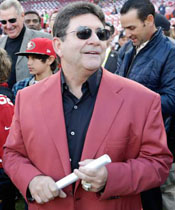
Eddie DeBartolo
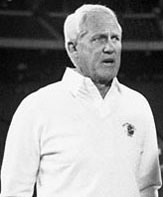
Bill Walsh
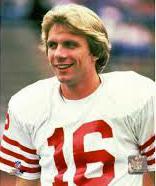
Joe Montana
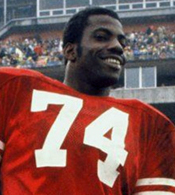
Fred Dean
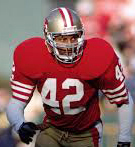
Ronnie Lott
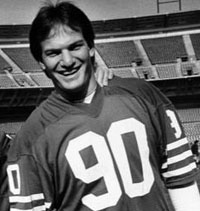
Todd Shell
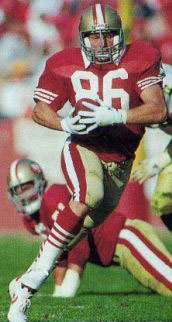
John Frank
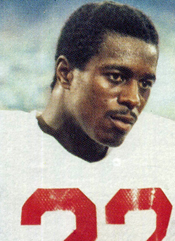
Dwight Hicks
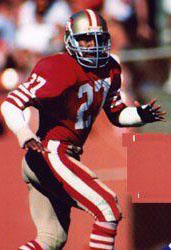
Carlton Williamson
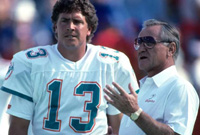
Dan Marino and Don Shula
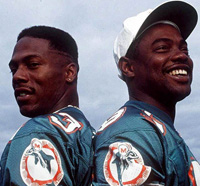
Mark Clayton and Mark Duper
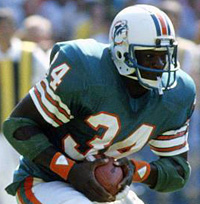
Woody Bennett
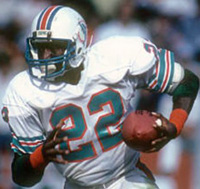
Tony Nathan
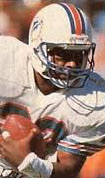
Joe Carter
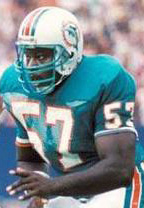
Dwight Stephenson
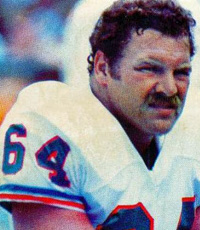
Ed Newman
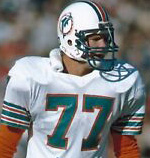
A. J. Duhe
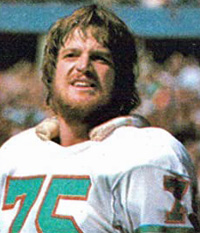
Doug Betters
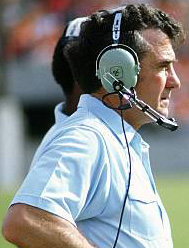
Chuck Studley
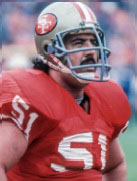
Randy Cross
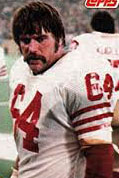
Hacksaw Reynolds
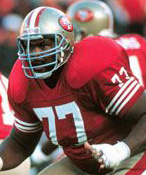
Bubba Paris
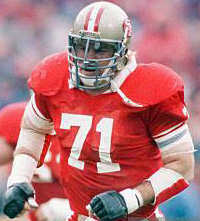
Bruce Fahnhorst
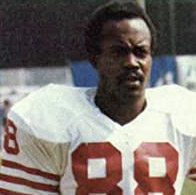
Freddie Solomon
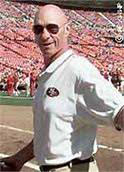
Bobb McKittrick
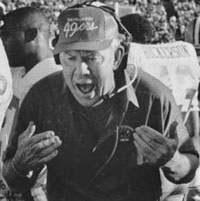
Bill McPherson
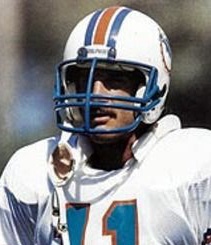
Jim Jensen
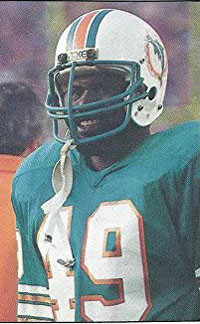
William Judson
|
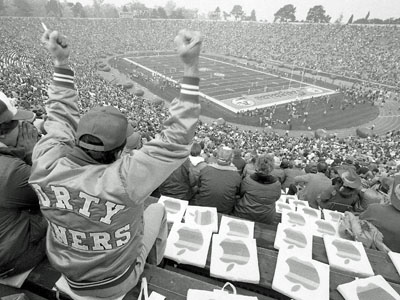 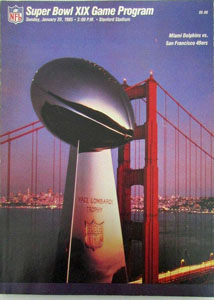
1984 San Francisco 49ers
| # |
Player |
Pos. |
Hgt. |
Wgt. |
College |
Exp. |
| 4 |
Max Runager |
P |
6-1 |
190 |
South Carolina |
6 |
| 6 |
Matt Cavanaugh |
QB |
6-2 |
210 |
Pittsburgh |
6 |
| 14 |
Ray Wersching |
K |
5-11 |
215 |
California |
12 |
| 16 |
Joe Montana |
QB |
6-2 |
195 |
Notre Dame |
6 |
| 21 |
Eric Wright |
CB |
6-1 |
180 |
Missouri |
4 |
| 22 |
Dwight Hicks |
S |
6-1 |
190 |
Michigan |
6 |
| 24 |
Derrick Harmon |
RB |
5-10 |
200 |
Cornell |
1 |
| 26 |
Wendell Tyler |
RB |
5-10 |
200 |
UCLA |
8 |
| 27 |
Carlton Williamson |
S |
6-0 |
205 |
Pittsburgh |
4 |
| 28 |
Tom Holmoe |
S |
6-2 |
190 |
BYU |
2 |
| 29 |
Mario Clark |
CB |
6-2 |
195 |
Oregon |
9 |
| 30 |
Bill Ring |
RB |
5-10 |
210 |
BYU |
4 |
| 32 |
Carl Monroe |
RB |
5-8 |
165 |
Utah |
2 |
| 33 |
Roger Craig |
RB |
6-0 |
220 |
Nebraska |
2 |
| 42 |
Ronnie Lott |
CB |
6-0 |
200 |
USC |
4 |
| 43 |
Dana McLemore |
CB |
5-10 |
185 |
Hawaii |
3 |
| 49 |
Jeff Fuller |
S |
6-2 |
215 |
Texas A&M |
1 |
| 50 |
Riki Ellison |
LB |
6-2 |
220 |
USC |
2 |
| 51 |
Randy Cross |
G |
6-3 |
265 |
UCLA |
9 |
| 52 |
Blanchard Montgomery |
LB |
6-2 |
235 |
UCLA |
2 |
| 53 |
Milt McColl |
LB |
6-6 |
250 |
Stanford |
4 |
| 56 |
Fred Quillan |
C |
6-5 |
265 |
Oregon |
7 |
| 57 |
Dan Bunz |
LB |
6-4 |
225 |
Cal-Riv,Long Beach |
7 |
| 58 |
Keena Turner |
LB |
6-2 |
220 |
Purdue |
5 |
| 62 |
Guy McIntyre |
G |
6-3 |
275 |
Georgia |
1 |
| 64 |
Jack Reynolds |
LB |
6-1 |
230 |
Tennessee |
15 |
| 65 |
Lawrence Pillers |
DE |
6-4 |
250 |
Alcorn State |
9 |
| 66 |
Allan Kennedy |
T |
6-7 |
275 |
Washington State |
4 |
| 67 |
Billy Shields |
T |
6-8 |
270 |
Georgia Tech |
10 |
| 68 |
John Ayers |
G |
6-5 |
265 |
Texas, W.Tex.A&M |
8 |
| 71 |
Bruce Fahnhorst |
T |
6-6 |
275 |
Minnesota |
11 |
| 72 |
Jeff Stover |
DE |
6-5 |
275 |
Oregon |
3 |
| 74 |
Fred Dean |
DE |
6-3 |
230 |
Louisiana Tech |
10 |
| 76 |
Dwaine Board |
DE |
6-5 |
250 |
North Carolina A&T |
6 |
| 77 |
Bubba Paris |
T |
6-6 |
295 |
Michigan |
2 |
| 78 |
Manu Tuiaosopo |
NT |
6-3 |
250 |
UCLA |
6 |
| 79 |
Jim Stuckey |
DE |
6-4 |
250 |
Clemson |
5 |
| 81 |
Russ Francis |
TE |
6-6 |
240 |
Oregon |
10 |
| 83 |
Renaldo Nehemiah |
WR |
6-1 |
180 |
Maryland |
3 |
| 85 |
Mike Wilson |
TE |
6-3 |
215 |
Washington State |
4 |
| 86 |
John Frank |
TE |
6-3 |
225 |
Ohio State |
1 |
| 87 |
Dwight Clark |
WR |
6-4 |
215 |
Clemson |
6 |
| 88 |
Freddie Solomon |
WR |
5-11 |
190 |
Tampa |
10 |
| 89 |
Earl Cooper |
TE |
6-2 |
225 |
Rice |
5 |
| 90 |
Todd Shell |
LB |
6-4 |
225 |
BYU |
1 |
| 94 |
Louie Kelcher |
NT |
6-5 |
290 |
SMU |
10 |
| 95 |
Michael Carter |
NT |
6-2 |
285 |
SMU |
1 |
| 97 |
Gary Johnson |
DE |
6-2 |
255 |
Grambling |
10 |
| 99 |
Michael Walter |
LB |
6-3 |
240 |
Oregon |
2 |
|
1984 Miami Dolphins
| # |
Player |
Pos. |
Hgt. |
Wgt. |
College |
Exp. |
| 4 |
Reggie Roby |
P |
6-3 |
250 |
Iowa |
2 |
| 5 |
Uwe von Schamann |
K |
6-0 |
190 |
Oklahoma |
6 |
| 10 |
Don Strock |
QB |
6-5 |
220 |
Virginia Tech |
11 |
| 11 |
Jim Jensen |
WR |
6-4 |
215 |
Boston U. |
4 |
| 13 |
Dan Marino |
QB |
6-4 |
215 |
Pittsburgh |
2 |
| 22 |
Tony Nathan |
RB |
6-0 |
205 |
Alabama |
6 |
| 23 |
Joe Carter |
RB |
5-11 |
200 |
Alabama |
1 |
| 28 |
Don McNeal |
CB |
5-11 |
190 |
Alabama |
5 |
| 31 |
Eddie Hill |
RB |
6-2 |
205 |
Memphis |
6 |
| 34 |
Woody Bennett |
RB |
6-2 |
225 |
Miami (FL) |
6 |
| 40 |
Mike Kozlowski |
S |
6-0 |
195 |
SDSU,BYU,Colorado |
6 |
| 41 |
Fulton Walker |
CB |
5-10 |
195 |
West Virginia |
4 |
| 42 |
Lyle Blackwood |
S |
6-1 |
190 |
TCU |
12 |
| 43 |
Bud Brown |
S |
6-0 |
195 |
Southern Miss |
1 |
| 44 |
Paul Lankford |
CB |
6-2 |
210 |
Penn State |
3 |
| 45 |
Robert Sowell |
CB |
5-11 |
175 |
Howard |
2 |
| 46 |
Pete Johnson |
FB |
6-0 |
250 |
Ohio State |
8 |
| 47 |
Glenn Blackwood |
S |
6-0 |
190 |
Texas |
6 |
| 49 |
William Judson |
CB |
6-1 |
190 |
South Carolina State |
3 |
| 50 |
Jackie Shipp |
LB |
6-2 |
235 |
Oklahoma |
1 |
| 51 |
Mark Brown |
LB |
6-2 |
225 |
Purdue |
2 |
| 52 |
Sanders Shiver |
LB |
6-2 |
225 |
Carson-Newman |
9 |
| 53 |
Jay Brophy |
LB |
6-3 |
235 |
Miami (FL) |
1 |
| 55 |
Earnest Rhone |
LB |
6-2 |
220 |
Henderson State |
10 |
| 56 |
Charles Bowser |
LB |
6-3 |
235 |
Duke |
3 |
| 57 |
Dwight Stephenson |
C |
6-2 |
255 |
Alabama |
5 |
| 58 |
Kim Bokamper |
DE |
6-6 |
255 |
Concordia,San Jose St. |
8 |
| 59 |
Bob Brudzinski |
LB |
6-4 |
225 |
Ohio State |
8 |
| 60 |
Jeff Toews |
C |
6-3 |
255 |
Washington |
6 |
| 61 |
Roy Foster |
G |
6-4 |
275 |
USC |
3 |
| 64 |
Ed Newman |
G |
6-2 |
255 |
Florida Atlantic, Duke |
12 |
| 70 |
Bill Barnett |
DT |
6-4 |
255 |
Nebraska |
5 |
| 71 |
Mike Charles |
DT |
6-4 |
290 |
Syracuse |
2 |
| 72 |
Ronnie Lee |
T |
6-3 |
265 |
Baylor |
6 |
| 73 |
Bob Baumhower |
NT |
6-5 |
265 |
Alabama |
8 |
| 74 |
Cleveland Green |
T |
6-3 |
260 |
Southern |
6 |
| 75 |
Doug Betters |
DE |
6-7 |
265 |
Montana, Nevada |
7 |
| 76 |
Steve Clark |
G |
6-4 |
255 |
Utah |
3 |
| 77 |
A. J. Duhe |
LB |
6-4 |
245 |
LSU |
8 |
| 78 |
Charles Benson |
DE |
6-3 |
265 |
Baylor |
2 |
| 79 |
Jon Giesler |
T |
6-5 |
260 |
Michigan |
6 |
| 80 |
Joe Rose |
TE |
6-3 |
230 |
California |
5 |
| 81 |
Jimmy Cefalo |
WR |
5-11 |
190 |
Penn State |
7 |
| 83 |
Mark Clayton |
WR |
5-9 |
175 |
Louisville |
2 |
| 84 |
Bruce Hardy |
TE |
6-5 |
230 |
Arizona State |
7 |
| 85 |
Mark Duper |
WR |
5-9 |
185 |
Northwestern State |
3 |
| 87 |
Dan Johnson |
TE |
6-3 |
240 |
Iowa State |
2 |
| 88 |
Vince Heflin |
WR |
6-0 |
185 |
Central State |
3 |
| 89 |
Nat Moore |
WR |
5-9 |
185 |
UT Martin, Florida |
11 |
|
References: The Super Bowl: Celebrating a Quarter-Century of America's Greatest Game (1990)
Building a Champion: On Football and the Making of the 49ers, Bill Walsh with Glenn Dickey (1990)
Super Bowl Chronicles: A Sportswriter Reflects on the First 30 Years of America's Game, Jerry Green (1995)
Super Bowl: The Game of Their Lives, Danny Peary (ed.) (1997)
The Football Game I'll Never Forget: 100 NFL Stars' Stories, selected by Chris McDonell (2004)
The Genius: How Bill Walsh Reinvented Football and Created an NFL Dynasty, David Harris (2008)
The Ultimate Super Bowl Book, Bob McGinn (2009)
50 Years, 50 Moments: The Most Unforgettable Plays in Super Bowl History, Jerry Rice and Randy O. Williams (2015)
Super Bowl Gold: 50 Years of the Big Game, Sports Illustrated (2015)
The Super Bowl: The First Fifty Years of America's Greatest Game, David Fischer (2015)
Montana: The Biography of Football's Joe Cool, Keith Dunnavant (2015)
The First 50 Super Bowls: How Football's Championships Were Won, Ed Benkin (2018)
Don Shula: A Biography of the Winningest Coach in NFL History, Carlo DeVito (2018)
|
|



